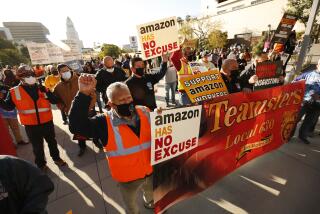Don’t ask Larry Ellison about women’s pay at Oracle

The biggest Silicon Valley companies have responded to complaints about unequal pay by disclosing the gaps between men and women doing similar work.
But not Oracle Corp.
The software giant’s board, led by founder Larry Ellison, 75, says it’s a waste of time and money because the company is already committed to equal pay for equal work.
Heather Smith, the vice president of sustainable investing at Pax World Funds who’s pushing to make the figures public, isn’t buying it — and neither is a majority of Oracle’s outside investors.
For a third consecutive year, Pax is calling on Oracle to produce a report identifying whether a gender pay gap exists and how to fix it. The petitions are part of a broader effort by Pax, fund manager Arjuna Capital and the $208-billion New York City Pension Funds to push many of the largest U.S. companies to make such disclosures. The proposal will be up for a vote at Oracle’s annual meeting on Nov. 19.
“Oracle can and should be doing more to close the gender gap in its workforce,” said Smith, whose firm oversees $4.5 billion.
It’s easy for companies to pay lip service to equal pay if they don’t actually have to show the progress they’re making. And in Oracle’s case, there’s at least some cause for concern. Both former employees and the U.S. government have sued the company, alleging it systematically underpaid women and people of color. Oracle has denied the allegations in both cases, which are pending.
More and more companies are being pressured to confront compensation disparities. About a dozen publicly traded tech giants, including Apple Inc. and Microsoft Corp., have published gender pay data after requests from Pax and others.
Last year, almost two-thirds of Oracle shareholders who aren’t senior executives or directors — including funds managed by BlackRock Inc. and State Street Corp. — supported Pax’s request that Oracle publish the figures, up from 56% a year earlier. They would have been approved with support from Ellison, who owns roughly a third of Oracle’s shares and has a net worth of $61.4 billion.
The board members unanimously recommended that investors vote against the proposal again this year. Public pay disclosures would be costly and time-consuming and “would not lead to meaningful gains in support of workforce diversity and gender pay equity” at the company, they said in a Sept. 27 regulatory filing.
Instead, the board said its existing efforts to promote women in tech, and the fact that four of its 14 directors are women, already put Oracle at the forefront of gender equality issues, particularly at the top. Chief Executive Safra Catz is also one of just a few women to lead an S&P 500 company.
Oracle didn’t reply to an emailed request for comment.
For Smith, the rationale behind measuring pay equity is simple. A growing body of research shows workforce diversity improves a firm’s financial performance, boosts innovation and tempers overconfident male CEOs. Pay differences are among the clearest signs of unfair treatment, which in turn hampers diversity in the workplace, said Joelle Emerson, founder of Paradigm Strategy.
“You cannot possibly fix a problem that you don’t measure,” said Emerson, whose firm helps companies conduct pay equity reviews.
Making those reviews public is important. A recent study showed the gender pay gap shrank at Danish companies that were required to publicly report such data after a law change in 2006. For firms exempt from the mandate, the disparities persisted.
Salesforce.com Inc. has spent millions of dollars raising the salaries of female workers after internal reviews repeatedly found disparities.
“I’ve had CEOs call me and say, ‘This is not true, this is not real,’” Salesforce founder Marc Benioff told CBS last year. “And I say to them, ‘This is true. Look at the numbers.’”
In one of the two pending lawsuits challenging Oracle’s compensation practices, an analysis conducted on behalf of three female engineers showed the company paid some women about $13,000 less per year on average versus male counterparts. The plaintiffs are seeking to represent more than 4,000 similarly situated employees.
In the other, the U.S. Department of Labor alleged that Oracle for years shortchanged women and minority workers by $400 million. In May, a judge rebuffed Oracle’s effort to block the department’s requests for employee wage data.
In the United Kingdom, government-mandated pay disclosures suggest that Oracle, like so many other big companies, still has more work to do when it comes to gender pay equality. Last year, the median hourly wage for women employed by Oracle in the country was 17% less than for men. The disparity for bonuses was a whopping 44%.
Pax’s proposal would require Oracle to conduct an analysis of pay equity, which factors in things like job level, function and geography. While that entails some number crunching, Emerson said the cost would hardly be prohibitive for a company like Oracle, which booked $11 billion of profit last year.
“Most companies might see it as more costly to not do this analysis and get sued for pay disparities,” she said.
So far, Pax and its partners in the effort have persuaded about three dozen companies to publicly release their pay equity figures.
Their petitions usually help to establish a dialogue with investor relations or human resources departments that can lead to a public disclosure, Smith said. As a result, many of the proposals didn’t require a shareholder vote.
Some of the early wins have had a knock-on effect. When Citigroup Inc. disclosed its numbers in early 2018, for example, other Wall Street firms followed within weeks. Citi subsequently released even more data. Its peers have yet to follow.
Oracle has been a different story. Pax’s letters and petitions have been largely ignored, Smith said. No matter what happens at next week’s meeting, she said, the fight for pay disclosure is far from over.
“All companies, regardless of sector or industry, should be addressing this issue,” Smith said. “We’re going to continue to press.”
More to Read
Inside the business of entertainment
The Wide Shot brings you news, analysis and insights on everything from streaming wars to production — and what it all means for the future.
You may occasionally receive promotional content from the Los Angeles Times.










